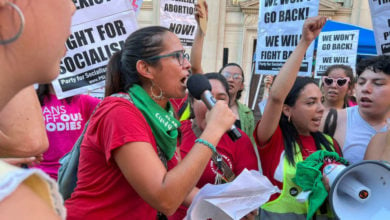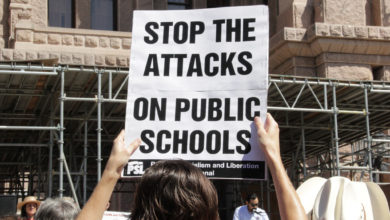The actions of the far-right district president of a community college in McKinney, Texas, has turned the school into a site of struggle. President H. Neil Matkin has understated the seriousness of COVID-19 despite campus deaths, let go professors for criticizing COVID conditions, and publicly chastised professors who criticized the Trump administration.
Matkin, who according to a FOIA request has a salary of just over $459,000, recently decided not to renew the contracts of three faculty members who have been vocal about unsafe work conditions during the pandemic. Matkin is one of multiple figures in Texas who have recently ignored the science of the spread of the virus; for example, Governor Greg Abbott recently lifted all COVID-19 restrictions in the state.
Professors Audra Heaslip, Suzanne Jones, and Lora Burnett signed a list of grievances last summer that outlined faculty members’ concerns about the college’s reopening plan. Heaslip and Jones represent two of three leadership members with the local chapter of Texas Faculty Association, a worker organization.
Even though a faculty member has died of COVID-19, Matkin has denied the severity of the pandemic, stating in August, “Effects of this pandemic have been blown utterly out of proportion across our nation and reported with unfortunate sensationalism.” Matkin also said masks were only “10% effective.”
Protesters speak in solidarity with professors
On March 2, a group of approximately 175 professors, students, and supporters gathered outside the college during a regular meeting of the board of trustees to protest in solidarity with the dismissed professors.
The protesters were met by campus police, who insisted the group move despite the protest taking place on a public campus. After the group moved to the sidewalk, campus police threatened to issue a citation to one of the event organizers for playing a speech by Dr. Martin Luther King, Jr.
Inside the meeting, speakers called for the professors to be reinstated, including history professor Michael Phillips. Phillips, who has taught at Collin College since 2007, said statements from faculty members were read anonymously due to fear of retaliation.
“A lot of people are being held hostage because their mortgage payment depends on that salary,” Phillips said. He noted Collin College doesn’t offer tenure like other community colleges in the area.
Phillips also experienced hostility from the administration in 2017 as part of the movement to remove Confederate statues in Dallas. Shortly before the murder of Heather Heyer, Phillips co-authored an article for The Dallas Morning News calling for the removal of the statues, and several Collin College professors, including Jones, signed on as academics — a standard industry practice. Each signer received negative feedback from their respective deans, as well as Matkin. Phillips said the deans and Matkin both said the concern was about “looking bad.” Phillips continues to ask, “Look bad to who exactly?”
Phillips said Matkin said to him, “I want to make sure you can keep your job,” implying his job was in jeopardy over his actions.
“This is an administration under which the free speech rights of faculty have steadily eroded,” Phillips said.
A long-standing reputation of suppressing free speech
In October 2020, Burnett tweeted a series of criticisms of Mike Pence during the vice presidential debate.
Burnett’s tweets were quoted by Fox News, which was looking for proof of “leftist indoctrination” in higher education. Burnett defended herself in their article, saying her personal politics did not affect her ability to teach in an unbiased way nor impact the way students work in her classes.
However, Collin College used the opportunity to condemn Burnett instead, putting out a press release two weeks after the tweets. The press release insultingly apologized on Burnett’s behalf and called her words “hateful, vile and ill-considered.” Matkin emailed the press release to all employees, and turned off the ‘reply all’ function after it garnered a negative response. The school ignored a demand from the Texas Faculty Association to rescind the statement.
Matkin cited pressure from “legislators” as his reason for calling out Burnett. However, a FOIA request turned up a text message conversation between Matkin and Texas Representative Jeff Leach. The conversation shows Matkin admitting the professor is “already on my radar,” preemptively threatening to “deal with it,” and wishing the right-wing representative “good luck in November friend.”
A COVID-19 death buried in 22nd paragraph of holiday email
In November, Collin College nursing teacher, Iris Meda, died from complications due to COVID-19.
A former nurse, Meda felt compelled by the urgency of the pandemic to come out of retirement to train essential health-care workers. She applied to Collin College, and accepted a position as an adjunct professor under the notion that she would be working remotely. This was not the case, and Meda came into contact with a symptomatic student who was not kept from entering the dual-credit classroom.
The announcement of her death was a nameless side note in the 22nd paragraph of a campus-wide email sent by President Matkin. To add insult to injury, the subject line read, “College Update & Happy Thanksgiving!”
In a since deleted tweet, Burnett wrote: “This is grim. None of my colleagues have been able to find out which faculty member died of Covid. So we think this may have been an adjunct. And we are sickened at how little respect our college president showed for that teacher’s life.” This tweet earned Burnett a “Level 1 warning” from the school.
Unite and fight together
Downplaying COVID-19 and suppressing free speech are but one of the same, each a part of the same anti-worker agenda. One creates a physically unsafe environment while the other builds a culture of subservience through fear of retaliation.
The conflict between the college’s board of trustees and executive leadership team with students and faculty is part of a larger class struggle. The Texas Faculty Association has since released their own press release expressing outrage over the recent dismissals, proclaiming they are exploring legal options.
“It is traditional for Americans to think of ‘working class’ as people who work in factories, but the economy has collapsed into a two class system — people whose money comes from stocks and inheritance, and people who work for a living. People might not think of professors as workers, but they are,” said professor Michael Phillips.
As is the norm under capitalism, the rights, safety, and individual liberties of workers are trampled, and objection through advocacy constitutes insubordination. Only continued labor organizing and a people’s movement can uproot this routine injustice. Collin College’s culture of fear will not stop the movement.
Donations can be made to Iris Meda’s funeral and medical expenses here.






